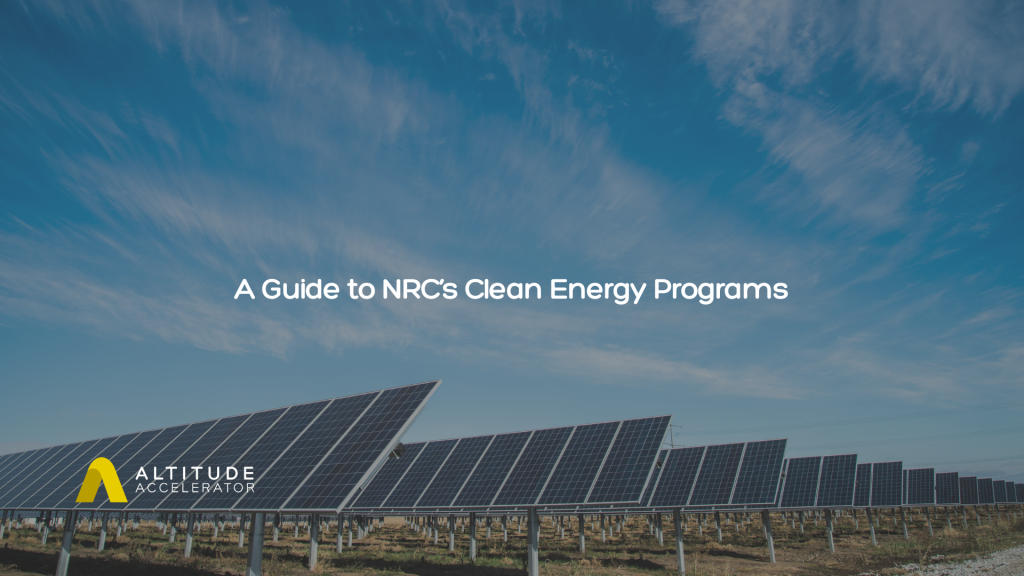Home » A Guide to NRC’s Clean Energy Programs: Unlocking Opportunities for Cleantech Innovation
A Guide to NRC’s Clean Energy Programs: Unlocking Opportunities for Cleantech Innovation

originally published: 2024-09-23 13:35:30
The Clean Energy Innovation program focuses on several key areas to address Canada’s clean energy transition.
In the near term, the program aims to enable fuel switching by using negative-value waste streams for fuel production. This involves waste material characterization and waste-to-fuel conversion processes. The program explores both biochemical processes and thermochemical processes. These efforts aim to increase market opportunities for technology developers while reducing energy costs for end-users.
Next, the electrification component of the program covers a broad spectrum of technologies. It works on developing more electric aircraft and hybrid propulsion systems, advancing cleaner aviation. In battery technology, the program addresses areas such as battery energy storage technologies for stationary and motive applications, supports battery supply chains, conducts microgrid component testing and integration, and explores critical minerals recovery and processing. It also supports the development of low-cost electric motors, striving to make clean transportation more accessible.
Canada is regarded “as one of the top 10 global producers of hydrogen today and is well-placed to transition to clean-hydrogen production and become a major clean-hydrogen exporter.” The Government of Canada’s introduction of their hydrogen strategy in 2020 helped assert this position. The hydrogen pillar focuses on clean hydrogen production, distribution, storage, and utilization. It also focuses on system integration and utilization, providing crucial support for decision-making through lifecycle and techno-economic analyses.
Lastly, in the field of carbon management, the program works on CO2 conversion to fuels and chemicals, CO2 mineralization, and CO2 transportation and sensing. These efforts will significantly impact fuel production, carbon management, and hydrogen technologies.
Overall, these programs are structured to address both near-term and long-term goals, with projects ranging from low to high Technology Readiness Levels (TRL). This approach ensures that the CEI program can support innovations at various stages of development, from early-stage research to near-market solutions.
Mississauga Advanced Materials Facility
The NRC operates six research facilities across Canada: three in Ontario, two in Quebec, and one in British Columbia.
One of these facilities, the Mississauga Advanced Materials Facility, plays a key role in supporting cleantech innovation. The center serves as an innovation hub and catalyst for accelerating material discovery and development through cutting-edge technology and multifaceted collaborations.
The Mississauga facility houses Materials Acceleration Platforms, a high-performance computing and AI/ML studio, and a mechatronics lab. It also provides advanced materials testing, large-scale powder production, and the ability to shape and enhance materials. Design, simulation, and digital fabrication are also key components of the facility’s offerings.
The team at the Mississauga facility possesses a wide range of competencies. They excel in materials discovery, synthesis, and production, as well as functional materials and components design and manufacturing. The team is also skilled in integration, validation, and testing, along with mechatronics, design, and automation. Their expertise also extends to AI/ML and software development. These capabilities make the Mississauga Advanced Materials Facility a significant resource for clean tech startups. The facility can support entrepreneurs in various ways, starting with accelerated materials discovery. Using self-driving laboratories and AI-guided process optimization, startups can speed up their material development processes. The facility’s electrocatalysis research capabilities offer end-to-end development for materials related to hydrogen production, CO2 reduction, and carbon capture.
For startups working on battery technologies, the facility’s research on Li-ion cathode materials and battery recycling can be invaluable. The powder synthesis and modification capabilities can support startups working on carbon management, electrification, and critical minerals. Additionally, the facility’s expertise in smart materials development, using advanced design and 3D printing techniques, can help startups create innovative materials for batteries, hydrogen and CO2 electrolyzers, and CO2 capture.
By leveraging these resources, clean tech startups can significantly accelerate their product development cycles and improve their chances of success in the market.
Altitude Accelerator
https://altitudeaccelerator.ca/
Altitude Accelerator is a not-for-profit innovation hub and business incubator for Brampton, Mississauga, Caledon, and other communities in Southern Ontario. Altitude Accelerators’ focus is to be a dynamic catalyst for tech companies. We help our companies grow faster and stronger. Our strength is our proven ability to foster growth for companies in Advanced Manufacturing, Internet of Things, Hardware & Software, Cleantech and Life Sciences. Our team consists of more than 100 expert advisors, industry, academic, government partners. The team helps companies in Advanced Manufacturing, Internet of Things, Hardware & Software, Cleantech and Life Sciences to commercialize their products and get them to market faster.


